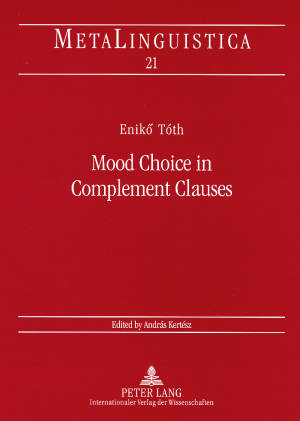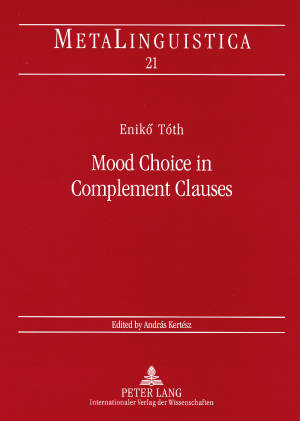
- Afhalen na 1 uur in een winkel met voorraad
- Gratis thuislevering in België vanaf € 30
- Ruim aanbod met 7 miljoen producten
- Afhalen na 1 uur in een winkel met voorraad
- Gratis thuislevering in België vanaf € 30
- Ruim aanbod met 7 miljoen producten
Zoeken
€ 66,95
+ 133 punten
Omschrijving
The volume investigates various approaches to mood distribution and mood variation in lexically selected complement clauses with special reference to Hungarian data. Its primary aim is to show that semantic factors play a crucial role in mood choice. The analysis focuses on the indicative/non-indicative opposition, the latter category includes the subjunctive, the imperative and the conditional. Critical discussion, revision and elaboration of previous semantic approaches pertaining to mood choice are presented, with particular emphasis on the applicability of the various analyses to mood phenomena in Hungarian. The author proposes two novel hypotheses about mood choice in Hungarian complement clauses.
Specificaties
Betrokkenen
- Auteur(s):
- Uitgeverij:
Inhoud
- Aantal bladzijden:
- 164
- Taal:
- Engels
- Reeks:
- Reeksnummer:
- nr. 21
Eigenschappen
- Productcode (EAN):
- 9783631572573
- Verschijningsdatum:
- 15/05/2008
- Uitvoering:
- Paperback
- Formaat:
- Trade paperback (VS)
- Afmetingen:
- 148 mm x 210 mm
- Gewicht:
- 229 g

Alleen bij Standaard Boekhandel
+ 133 punten op je klantenkaart van Standaard Boekhandel
Beoordelingen
We publiceren alleen reviews die voldoen aan de voorwaarden voor reviews. Bekijk onze voorwaarden voor reviews.








